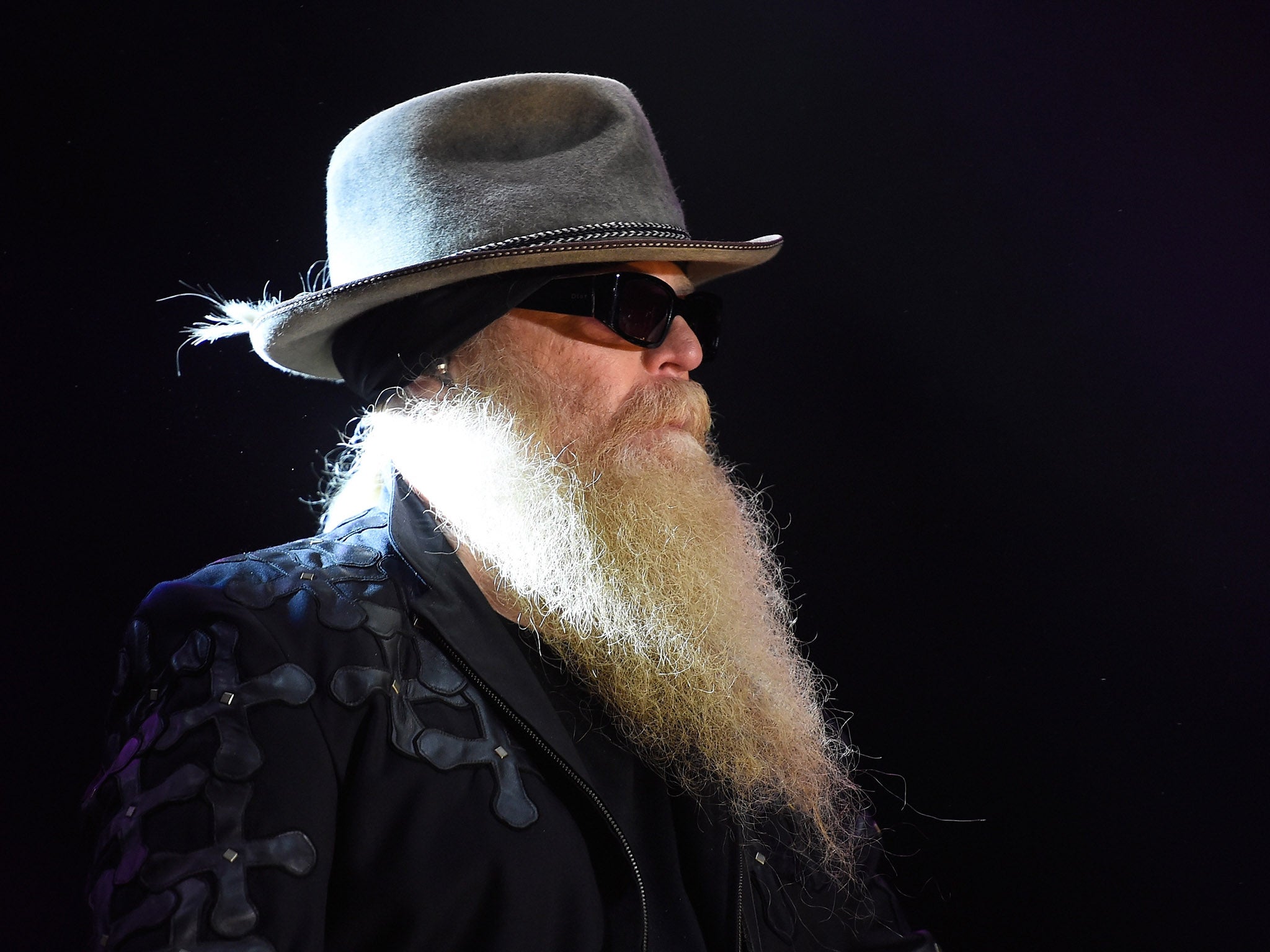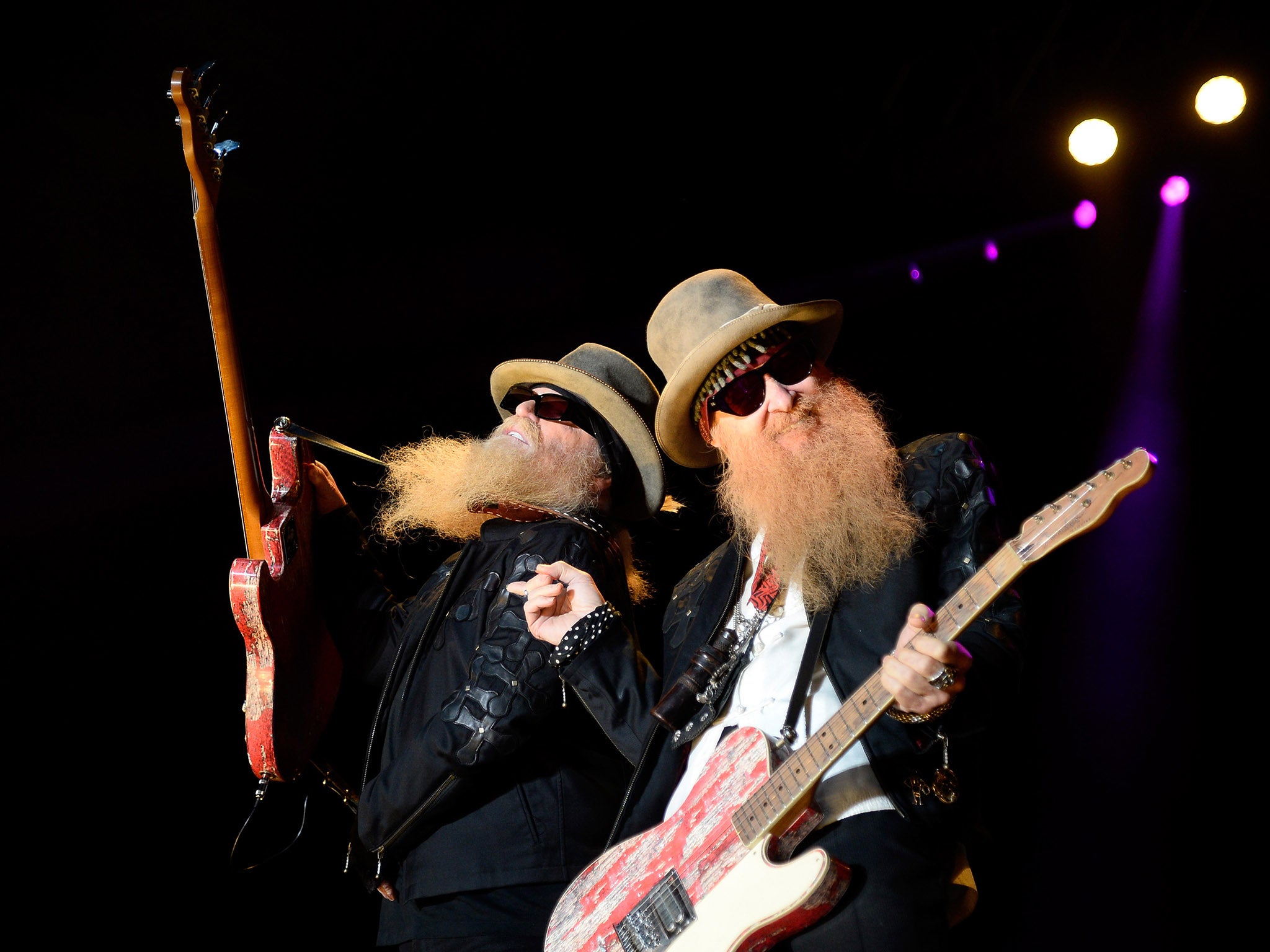Dusty Hill: ZZ Top bassist who helped bring Texas rock to the charts
Known for his legendary foot-long beard, the seasoned blues musician and his two bandmates enjoyed huge commercial success with 1983’s MTV-friendly album ‘Eliminator’, which sold more than 10 million copies

Dusty Hill, the bearded, understated bassist who helped make ZZ Top one of the biggest rock acts of the late 1970s and Eighties, anchoring songs including the shuffle boogie “La Grange” and showcasing his singing on the sultry Top 40 hit “Tush”, has died aged 72.
Formed in Houston in 1969, ZZ Top were one of rock’s most durable bands, with a line-up that remained the same for more than 50 years. Hill was joined onstage by lead singer and guitarist Billy Gibbons, whose boogie-style blues riffs established him as one of his generation’s finest rock guitarists, and drummer Frank Beard, who despite his name was the only band member not to have a foot-long beard that rivalled Rip Van Winkle’s.
Although they called themselves “that little ol’ band from Texas”, ZZ Top grew into an international sensation by the early 1980s, launched to fame in part by extravagant tours and MTV music videos filled with hot rods and strutting young women. In the video for their 1984 single “Legs” – it was one of their two Top 10 hits, along with the 1985 single “Sleeping Bag” – Hill and Beard spun a pair of custom fur-covered guitars.
While the band adapted to pop music trends, incorporating synthesisers and drum machines in response to the rise of new wave, their music remained essentially blues rock. It was also thoroughly Texan, with albums such as Rio Grande Mud (1972), Tres Hombres (1973), Tejas (1976) and Deguello (1979), a reference to the bugle call that the Mexican army played during the siege of the Alamo.
One of their most enduring hits, the FM radio staple “La Grange”, was a 1973 ode to a small-town brothel, later immortalised by author and playwright Larry L King as The Best Little Whorehouse in Texas.
“A lot of people lump us in with southern boogie, whatever that means,” King told music journalist Michael Hann in a 2012 interview. “It had an implication of being overly simplistic … A lot of people make the mistake of thinking the blues is very simple music. But it’s not easy to play well. People say jazz is real music because it’s very intricate. But they’re both very intricate.”
Hill was a seasoned blues musician by the time he joined ZZ Top, having played bass with performers including Freddie King and Lightnin’ Hopkins. But he was originally a singer – as he told it, his older brother, a guitarist, made him learn the bass at age 13 because they needed a bassist in their band – and occasionally sang for ZZ Top, demonstrating his upper-register abilities on songs such as “Tush”.
He and the band wrote “Tush” during a soundcheck in Alabama “in about six or eight minutes”, he told Guitar World in 2008. “It was hot as hell, and with the exception of a very few words the song you hear on the record is what we wrote that day,” he said. “We always tape our soundchecks for that very reason. Usually, though, it’s a little lick or a vocal line or something, not a whole damn song!”
Joseph Michael Hill was born in Dallas on 19 May 1949. His mother introduced him to blues records, to the surprise of some of their white neighbours. As Hill told it, his friends’ parents were often shocked when he brought over albums by Muddy Waters or Son House.

When he was in his late teens, he and his brother Rocky formed a garage rock band, American Blues, with drummer Frank Beard, a fellow North Texas native. They grew their hair long and, to match their name, dyed it blue.
“In the Sixties, having long hair in Texas, you took your life in your hands,” Hill told the Dallas Morning News in 2008. “But having long hair and blue hair, people just assumed we were nuts and left us alone.”
After a few years, Beard and then Hill joined ZZ Top, which emerged out of the break-up of Gibbons’s psychedelic band the Moving Sidewalks. They were not technically original members – drummer Dan Mitchell and bassists Lanier Greig and Billy Ethridge were part of earlier iterations – but joined in time to record the group’s debut album, ZZ Top’s First Album (1971).
Named in part for Texas blues singer ZZ Hill, the band played some of their first shows at cafeterias, Knights of Columbus halls, lumber yards and a National Guard armoury. Hill had been influenced by Jack Bruce, the adventurous bassist for Cream, but said he learned to take a more minimalist approach to his instrument while playing with a trio.
“I realised that you have to do the song, not your personal performance,” he told the website For Bass Players Only.
In the mid-1970s, ZZ Top staged the Worldwide Texas Tour, performing on a Texas-shaped stage home to wagon wheels, corral fences, cacti and live animals including rattlesnakes, vultures, a longhorn and buffalo. They later turned toward synth-pop in albums such as Eliminator (1983), which sold more than 10 million copies and included the hits “Gimme All Your Lovin’” and “Sharp Dressed Man”.
ZZ Top were inducted into the Rock & Roll Hall of Fame in 2004. They continued to experiment in records such as La Futura (2012), their most recent studio album, which was co-produced by hip-hop veteran Rick Rubin and included “I Gotsta Get Paid,” a bluesy cover of DJ DMD’s “25 Lighters”.
Survivors include his wife, the former Charleen “Chuck” McCrory; and a daughter from a previous marriage, Charity.
In a 1986 interview with The Washington Post, Hill and Gibbons recalled that they each started growing their famously long beards during a three-year break from touring in the late 1970s, without realising that the other person was doing it. “When we laid eyes on each other, I thought, that’ll work,” Gibbons said.
By the time their music videos started airing on MTV, the beards were an essential part of their stage persona. Hill said there was no question of ever shaving, even if he were to retire. “I’m a sex symbol,” he told The Post with a laugh. “Is that wild? It blows me away. I mean, I’ve always known it, I just figured nobody else did.”
Dusty Hill, bassist, born 19 May 1949, died 27 July 2021
© The Washington Post
Join our commenting forum
Join thought-provoking conversations, follow other Independent readers and see their replies
Comments

Bookmark popover
Removed from bookmarks